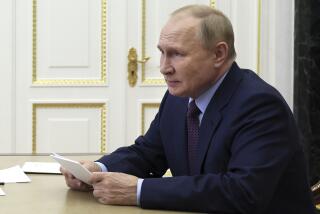U.S. Probe Focuses on Alleged Spy Payments to Bloch
WASHINGTON — U.S. investigators have begun to unravel a chain of evidence pointing toward what they believe are large amounts of money received by suspended State Department official Felix S. Bloch for his alleged spying for the Soviet Union, officials said Friday.
At the same time, investigators said the inquiry has been expanded to include other diplomatic personnel, particularly those who worked with Bloch during his foreign assignments in Austria, East Germany and other countries.
Examining the activities of colleagues is standard procedures in such investigations, but it is being pursued with particular intensity in the Bloch case.
“There is obvious concern that he may have pulled others in with him,” said one source.
Another official said, “Under the circumstances, we’d be remiss if we didn’t look at other possibilities.”
According to officials familiar with the Bloch inquiry, there is as yet no firm evidence of involvement by others. But one senior Administration source said: “We now believe that he is not the only one (spying for the Soviet Union). There are heavy suspicions that there are others, perhaps but not necessarily associated with Bloch.”
Bloch, 54, a 30-year Foreign Service officer, has been suspended from his job as head of the State Department office that deals with the European Economic Community.
Investigators have said they suspect he supplied sensitive information to the Soviets for about 15 years, a period in which he was a diplomatic officer in the U.S. Mission in East Germany and later the No. 2 official in the U.S. Embassy in Vienna.
Enough evidence has not been compiled to arrest Bloch, who has been staying at his father’s apartment in Manhattan and a daughter’s home in suburban Westchester County, N.Y., since news of the inquiry was disclosed last week.
However, officials said that they are focusing on financial inducements as perhaps the chief motive for his alleged spying activities.
Sources said investigators are in the initial stages of tracking down foreign accounts or assets that could have been used to hide large payments that continued over many years.
“It’s a process of looking under rocks for the evidence,” said one Bush Administration official. “We’ve begun to find the rocks.”
Bloch has refused to cooperate with the investigation. The New York Times reported in its Friday editions that Bloch, after he was allegedly videotaped passing a briefcase to a suspected Soviet agent in Paris last month, told FBI agents that he had been working with the Soviets for many years and had received “a lot of money” from them. The report said he refused to elaborate or cooperate further after that brief interview.
However, a government official with knowledge of the investigation said Friday that he does not believe Bloch ever made significant admissions to the agents.
Investigators said that without a confession from Bloch, tracing money received from alleged spying activities could be crucial to making a criminal case against him. Even if espionage charges could not be supported, financial records could provide enough evidence for a tax evasion case, they said.
Bloch’s 1989 financial disclosure forms filed with the State Department show that he and his wife, Lucille, had investments in stock and bond mutual funds worth at least $478,000 and perhaps as much as $1.3 million. Government disclosure forms require only that assets be reported within certain broad ranges, so a more precise estimate of Bloch’s net worth is not possible.
In addition, they have more than $200,000 in equity in a luxury condominium in Washington’s fashionable Kalorama neighborhood.
While substantial, the holdings do not appear to be beyond what a senior Foreign Service officer from an affluent family might have amassed. Bloch’s father owned a New York paper exporting business before his retirement.
As investigators are seeking evidence of other possible assets, several U.S. agencies are attempting to determine what confidential information could have been passed to the Soviets by someone in Bloch’s high-ranking position.
Federal agencies are being asked to go through their records to see what sensitive material passed through Austria between 1980 and 1987 during Bloch’s assignment in Vienna.
The State Department, Pentagon and U.S. intelligence agencies specifically have been asked by investigators to cull their files for anything specifically earmarked for Bloch’s office. Senior U.S. sources predicted that the process of assembling and evaluating the information could take weeks, if not months.
Investigators have said that they do not know what might have been in the briefcase Bloch passed to the suspected Soviet agent in Paris.
Times staff writers Ronald J. Ostrow and David Lauter contributed to this story.
More to Read
Sign up for Essential California
The most important California stories and recommendations in your inbox every morning.
You may occasionally receive promotional content from the Los Angeles Times.








